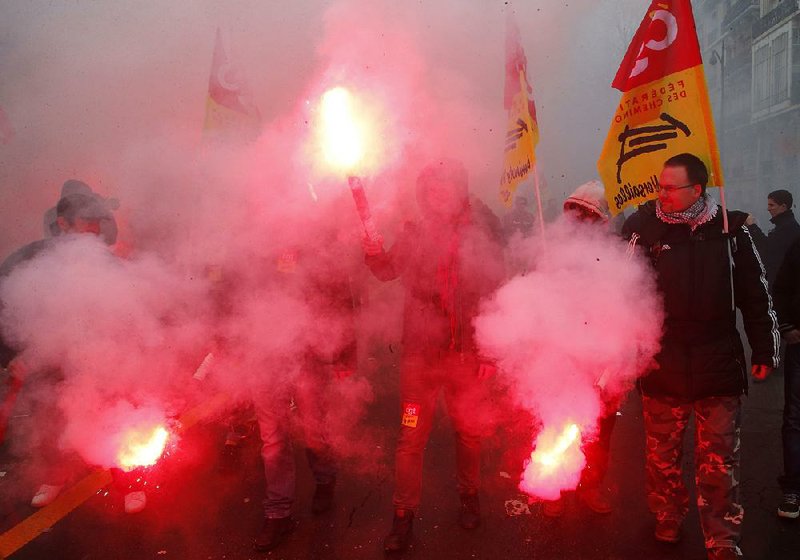PARIS -- Tens of thousands of people protested Wednesday across France against President Francois Hollande's determination to achieve what his conservative predecessor didn't even dare to try -- tamper with the 35-hour workweek.
Workers, unemployed and youths joined forces Wednesday, answering calls from student organizations and unions in more than 200 cities across France to try to kill the bill, which has even divided Hollande's ruling Socialist party.
Paris police said between 27,000 and 29,000 protesters took to the streets in the French capital. Various unions quoted by media outlets put the estimate much higher, between 80,000 and 100,000 on the chilly, rainy day.
The protests were held on the same day as railroad strikes that delayed some suburban and long-distance trains -- but not transportation networks in Paris.
The contested labor change would amend France's 35-hour workweek, approved in 2000 by the Socialists and now a cornerstone of the left. The current Socialist government wants adjustments to reduce France's 10 percent unemployment rate as the shortened workweek was meant to do.
The proposal technically maintains the 35-hour workweek, but allows companies to organize alternative working times without following industrywide deals, up to a 48-hour workweek and 12 hours per day. In "exceptional circumstances," employees could work up to 60 hours a week.
To allow companies to deal with business booms, one measure would allow employees to work more than 35 hours without being paid overtime. In exchange, they would have more days off later on. Other measures would relax rules on layoffs and working from home and at night.
The proposals have turned all major employee unions and youth organizations against the government. With next year's presidential election looming and Hollande's popularity having reached its low point, legislation to make it easier for companies to end employment deals is fueling discontent in a country hurt by the economic downturn.
Hollande's predecessor, Nicolas Sarkozy, had vowed to end France's 35-hour week, but he never scrapped the policy during his five-year tenure.
"This law is even more shocking that it has been drafted by Socialists," said a telecommunications company employee who asked to be identified only as Manuel.
"This law is just aiming at making layoffs easier for companies," he told The Associated Press at a big gathering on Paris' Place de la Republique.
Several high schools across France were blocked off by students who set up barricades with garbage cans.
Outside the Helene Boucher high school, students cheered any mention of how the movement would prevent Hollande and the government from passing the bill.
Maryanne Gicquel, a spokesman for the FIDL student union, described young people's journey toward a stable job as "a succession of internships and poorly paid jobs."
"Now we're being told that it will be easier for companies to lay off workers," she said.
Prime Minister Manuel Valls' government insisted that the bill won't be withdrawn, but discussions continue with union representatives. The bill, initially set to be discussed at a Cabinet meeting Wednesday, has been delayed by two weeks as opposition grows.
Hollande reiterated his support for the bill after meeting with his ministers at the Elysee Palace on Wednesday.
Martine Aubry -- the former first secretary of the Socialist Party and architect of the 35-hour week -- described it as "the preparation of a long-lasting weakening of France, and of course, the left."
Many protesters agreed with her.
"This whole thing has one goal: destroying our labor code, while we should all think about new ways of reducing the average working hours," said Sebastien Marchal, a 36-year-old graphic designer.
Information for this article was contributed by Alex Turnbull and Sylvie Corbet of The Associated Press.
Business on 03/10/2016

